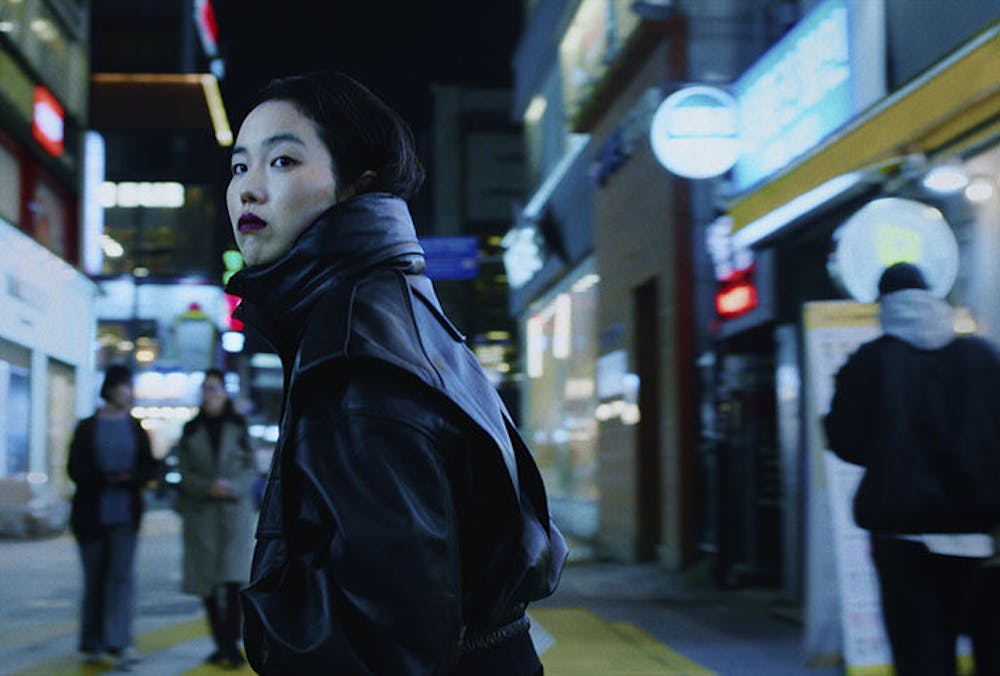At its surface, “Return to Seoul” seems to address a familiar story: An adoptee returns home to search for their biological parents. But the film handles this well-known narrative with remarkable cultural and emotional nuance, distinguishing it from comparable works.
Together, Cambodian-French director Davy Chou and cinematographer Thomas Favel craft a story with vivid detail about a character working through deep emotional insecurities while navigating momentous triumphs and devastations. Favel’s crisp shots full of vibrant color elevated the film, helping it earn the recognition of Un Certain Regard at the 2022 Cannes Film Festival — a prize that highlights promising filmmakers who create ambitious new works. The film was released in American theaters in February.
In her breakout film role, French-Korean visual artist and actress Park Ji-Min delivers a poignant and fierce performance as Frédérique Benoît or “Freddie,” a South Korean-born French adoptee. Freddie is young, aggressively independent and has the luxury of traveling across the world to South Korea on a whim and with no clear purpose. The viewer meets Freddie after her arrival in Seoul as she has a drink with two acquaintances. Right from the start, it becomes clear that she does not speak Korean, nor does she intend to adapt to local customs.
Chou and Park carefully establish Freddie’s character, avoiding tedious and unnecessary analysis that grants viewers the freedom to identify emotional pressure points that build up throughout the movie. This careful character-building offers a deeper understanding of Freddie’s struggles to establish healthy relationships.
At this point, Freddie’s reasons for traveling to South Korea are still ambiguous. The pursuit of her biological parents becomes a concern only after hotel clerk and interpreter Tena (Guka Han) suggests Freddie consider contacting the adoption agency her parents used. Soon after, she schedules an appointment, to which she arrives without any identifying information save for a photo from her adoption file.
By law, the agency can only allow Freddie to contact her parents twice a year — and only by telegram. This is absurd to Freddie, who is visiting South Korea for less than two weeks. The scene establishes an anxiety that lingers throughout the film: Her parents may never respond to her or could even refuse to meet her.
The process also reveals her birth name, Yeon-hee, which in Korean means “docile and joyful.” This brilliant detail is antithetical to Freddie’s personality, which at first seems cold and unbothered. The element of irony opens new possibilities for exploring Freddie’s reckless and emotionally stagnant personality.
The contrast between these two seemingly irreconcilable sides of her personality is amplified once Freddie meets her father (Oh Kwang-rok), an air conditioning repairman in Gunsan, South Korea.
In Gunsan, Freddie grapples with overwhelming expressions of guilt from her father’s family, who express regret for their decision to “give up” Freddie years ago. She relies on Tena to awkwardly translate these conversations from French to Korean and then back to French.
The encounter disturbs Freddie’s cool, unbothered demeanor: She cannot identify with her father’s family’s sincere hope to rekindle their relationship, which comes to a boiling point when the film cuts to Freddie a few years later.
This new Freddie wears leather, lives with a sleazy tattoo artist in a techno bunker and works for a French consulting company. Each time the film jumps to a new point in her life, Freddie seemingly reinvents herself, pursuing new careers, hanging out with different people and sporting a new look.
“Return to Seoul” never shows Freddie in France. The film lingers in South Korea, where Freddie finds herself returning over the years, attempting to understand her complicated relationship with the country and her identity.
The film strikes an effective balance between Freddie’s independent growth and the emotionally demanding process of rekindling a relationship with her biological family — which, even after noticeable developments, still feels threatening to her conceptually. The ambiguity of Freddie’s first trip is maintained throughout each visit, intensifying the viewer’s desire to follow the changing nature of her familial relationships. The uncertainty surrounding Freddie’s potential reunion with her mother, for instance, leaves audiences anxious with anticipation until the very end.
“Return to Seoul” is best experienced in humble settings — perhaps by yourself, definitely at a small theater — and excels because viewers experience Freddie’s triumphs and defeats without being forced to decide whether they like her or not. By the end of the film, audiences might wish they could meet Freddie, a few more years into the future.





